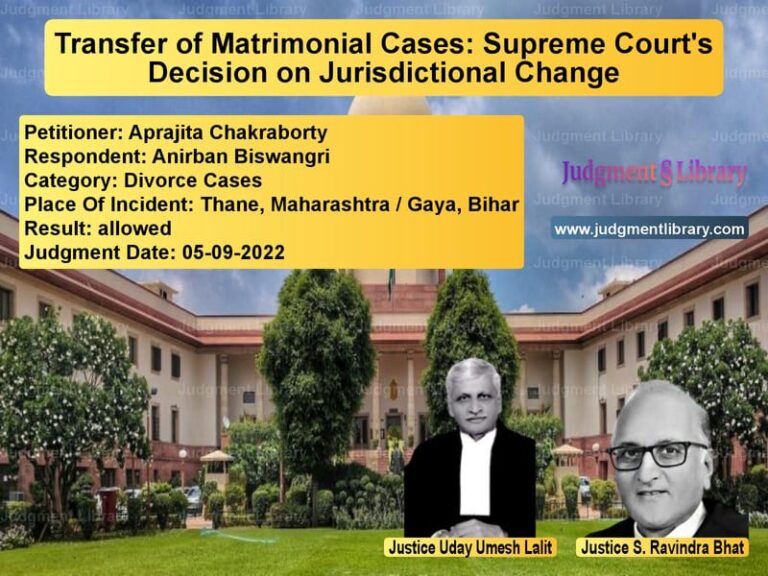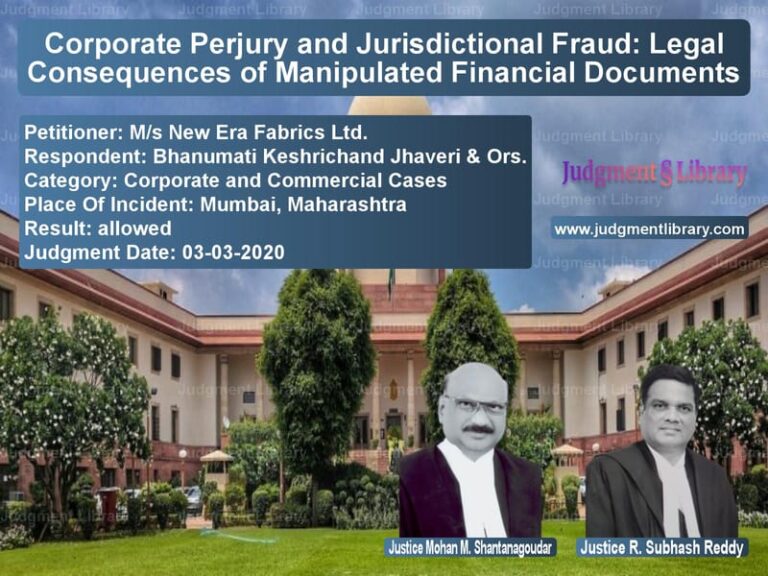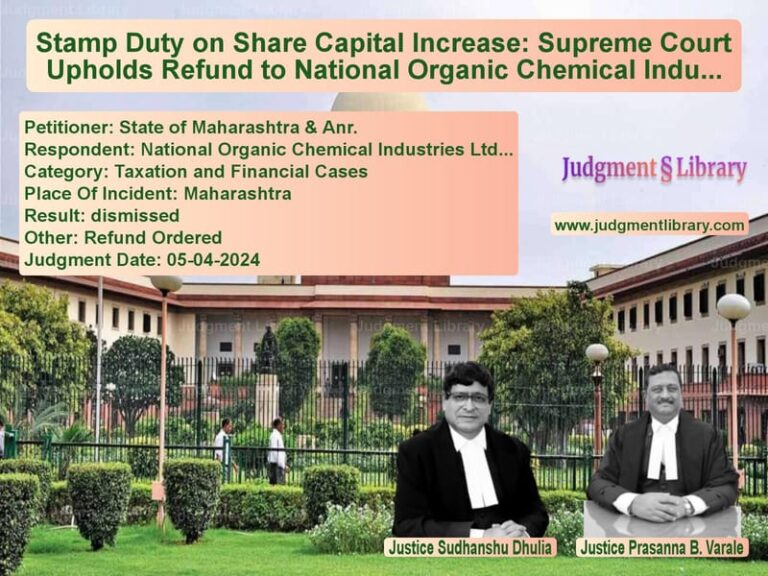Supreme Court Strikes Down Maharashtra’s Nutrition Tender: Vaishnorani Mahila Bachat Gat vs. State of Maharashtra
The Supreme Court of India, in Vaishnorani Mahila Bachat Gat vs. State of Maharashtra, ruled against the Maharashtra government’s tender conditions for the supply of ready-to-cook food to Anganwadi centers under the Integrated Child Development Scheme (ICDS). The Court held that the conditions were arbitrary and favored large corporate players over local self-help groups and Mahila Mandals, thus violating earlier judicial directions and government policies promoting decentralized food supply.
Background of the Case
The State of Maharashtra issued a tender notice on March 8, 2016, inviting bids for the supply of ready-to-cook food for Anganwadi centers. The food was to be provided as supplementary nutrition for children, pregnant and lactating women, and adolescent girls.
The tender required bidders to have:
- A turnover of at least Rs. 1 crore in any of the last three financial years.
- Machinery certified by a chartered engineer as capable of producing ready-to-cook food.
- A licensed, in-house quality control laboratory for food safety testing.
- Mandatory use of extrusion technology in the production of food.
Self-help groups (SHGs) and Mahila Mandals challenged the tender, arguing that these conditions effectively excluded local women-led organizations and allowed large private contractors to dominate the supply chain, in violation of Supreme Court orders in earlier cases like People’s Union for Civil Liberties (PUCL) vs. Union of India.
Petitioner’s Arguments
The petitioners contended that:
- The tender conditions violated the Supreme Court’s 2004 and 2006 rulings in PUCL, which mandated that nutrition supply should be decentralized and handled by SHGs and Mahila Mandals.
- Large industrial groups masquerading as Mahila Mandals had been awarded contracts, effectively excluding genuine local women’s groups.
- The tender conditions were arbitrary and discriminatory, designed to favor well-funded businesses with political connections.
- The government’s insistence on the use of extrusion technology was baseless, as the Government of India had not mandated its use.
Respondent’s Arguments
The State of Maharashtra argued that:
- The tender conditions were necessary to ensure food safety and hygiene.
- Extrusion technology was recommended by experts to enhance the nutritional value and shelf life of the food.
- The conditions were framed in line with previous Supreme Court rulings and government policies.
Supreme Court’s Observations
1. Violation of PUCL Judgment
The Supreme Court found that the tender conditions directly contradicted its earlier ruling in PUCL vs. Union of India (2001), which had stated:
“The contractors shall not be used for the supply of nutrition in Anganwadis, and ICDS funds shall be spent by making use of village communities, self-help groups, and Mahila Mandals for buying of grains and preparation of meals.”
2. Exclusion of SHGs and Mahila Mandals
The Court noted that the requirement of a high turnover and advanced food-processing technology made it nearly impossible for SHGs and Mahila Mandals to compete. The Court ruled:
“By imposing conditions that favor large-scale industries, the State has effectively excluded local women’s groups, thereby undermining the very purpose of the ICDS scheme.”
3. Mandatory Use of Extrusion Technology
The Court found that the Maharashtra government had misrepresented the Government of India’s policy on food preparation methods. The Central Government had clarified in 2010 that extrusion technology was only suggestive, not mandatory.
“The Maharashtra government’s insistence on extrusion technology was based on a misrepresentation of the Union Government’s recommendations. It cannot be imposed as a mandatory requirement.”
4. Corruption in Nutrition Supply
The Court also took note of reports highlighting large-scale corruption in the supply of nutrition, where politically connected private firms were posing as Mahila Mandals to win contracts. A Commissioner’s report in the PUCL case had found that:
- Several so-called Mahila Mandals were actually front organizations for large private firms.
- Private contractors were supplying substandard food in violation of Supreme Court orders.
- Significant amounts of ICDS funds were being siphoned off.
Final Judgment
The Supreme Court:
- Struck down the Maharashtra government’s tender conditions as arbitrary and discriminatory.
- Ordered the State to reissue the tender within four weeks, ensuring that SHGs and Mahila Mandals could participate.
- Directed the State to form smaller procurement units at the panchayat or district level to facilitate local participation.
- Emphasized that any alternative nutrition supply arrangement must align with ICDS policy and earlier Supreme Court rulings.
Key Takeaways
- Protection of SHGs and Mahila Mandals: The judgment reinforces the right of local women’s groups to participate in nutrition supply under ICDS.
- Restriction on Private Contractors: Large corporations cannot monopolize food supply for Anganwadis.
- Judicial Scrutiny of Government Tenders: The Court reaffirmed that tender conditions must be fair and promote genuine competition.
- Decentralized Nutrition Supply: Localized food production remains the preferred approach under government policy.
Conclusion
The Supreme Court’s decision in Vaishnorani Mahila Bachat Gat vs. State of Maharashtra is a landmark ruling for women’s self-help groups and community-driven governance. By striking down Maharashtra’s biased tender conditions, the Court has upheld the principle that ICDS nutrition supply should be decentralized and inclusive, ensuring that the benefits reach those who need them the most.
Petitioner Name: Vaishnorani Mahila Bachat Gat.Respondent Name: State of Maharashtra & Others.Judgment By: Justice Arun Mishra, Justice Deepak Gupta.Place Of Incident: Maharashtra.Judgment Date: 26-02-2019.
Don’t miss out on the full details! Download the complete judgment in PDF format below and gain valuable insights instantly!
Download Judgment: Vaishnorani Mahila B vs State of Maharashtra Supreme Court of India Judgment Dated 26-02-2019.pdf
Direct Downlaod Judgment: Direct downlaod this Judgment
See all petitions in Contract Disputes
See all petitions in Public Interest Litigation
See all petitions in Consumer Rights
See all petitions in Judgment by Arun Mishra
See all petitions in Judgment by Deepak Gupta
See all petitions in allowed
See all petitions in Remanded
See all petitions in supreme court of India judgments February 2019
See all petitions in 2019 judgments
See all posts in Civil Cases Category
See all allowed petitions in Civil Cases Category
See all Dismissed petitions in Civil Cases Category
See all partially allowed petitions in Civil Cases Category







